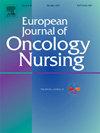Living with a chronic hematological malignancy: Perspectives on PRO-based management of symptoms
IF 2.7
3区 医学
Q1 NURSING
引用次数: 0
Abstract
Purpose
To explore study participants’ experiences with chronic hematologic malignancies and their perspectives on symptom management based on patient-reported outcomes during follow-up care.
Methods
This qualitative descriptive study used semi-structured telephone interviews conducted from May 2022 to February 2023. A purposeful sample was recruited, with participants invited consecutively. Participants were adults ≥18 years diagnosed with a chronic hematological malignancy and participating in a symptom management intervention. Reflexive thematic analysis, as described by Braun and Clarke, was used to perform an inductive analysis of the interview data.
Results
A total of 19 telephone interviews were conducted with 17 participants. Participants had nuanced perspectives on managing life with a chronic and uncommon hematological malignancy reflected in the following themes: not allowing the disease to dominate, struggling to understand and manage the disease, navigating everyday life with the disease, and evaluating impact and tailoring of patient reported outcome-based symptom management.
Conclusion
This study emphasizes the ambiguity of living with a chronic hematological malignancy. Participants strive to prevent the disease from dominating their lives, despite their struggles to understand and manage the disease. The use of patient-reported outcomes in dialogue and targeted symptom management helped participants navigate daily life challenges. These findings underscore important considerations for enhancing follow-up care for patients with chronic hematological malignancies.
慢性血液恶性肿瘤患者的生活:基于 PRO 的症状管理视角。
目的:根据随访期间患者报告的结果,探讨研究参与者在慢性血液系统恶性肿瘤方面的经历及其对症状管理的看法:这项定性描述性研究采用半结构式电话访谈,访谈时间为 2022 年 5 月至 2023 年 2 月。研究采用有目的的抽样调查,连续邀请参与者。参与者均为≥18岁的成年人,被诊断患有慢性血液恶性肿瘤并参与了症状管理干预。根据布劳恩(Braun)和克拉克(Clarke)的描述,采用反思性主题分析法对访谈数据进行归纳分析:共对 17 名参与者进行了 19 次电话访谈。结果:共对 17 名参与者进行了 19 次电话访谈。参与者对慢性和不常见血液恶性肿瘤患者的生活管理有着细微的看法,这些看法反映在以下主题中:不让疾病主宰生活、努力理解和管理疾病、带着疾病度过日常生活、评估患者报告的基于结果的症状管理的影响和调整:本研究强调了慢性血液恶性肿瘤患者生活的模糊性。尽管参与者在理解和管理疾病方面困难重重,但他们仍努力防止疾病主宰自己的生活。在对话中使用患者报告的结果和有针对性的症状管理有助于参与者应对日常生活中的挑战。这些发现强调了加强慢性血液恶性肿瘤患者随访护理的重要考虑因素。
本文章由计算机程序翻译,如有差异,请以英文原文为准。
求助全文
约1分钟内获得全文
求助全文
来源期刊
CiteScore
4.40
自引率
3.60%
发文量
109
审稿时长
57 days
期刊介绍:
The European Journal of Oncology Nursing is an international journal which publishes research of direct relevance to patient care, nurse education, management and policy development. EJON is proud to be the official journal of the European Oncology Nursing Society.
The journal publishes the following types of papers:
• Original research articles
• Review articles

 求助内容:
求助内容: 应助结果提醒方式:
应助结果提醒方式:


